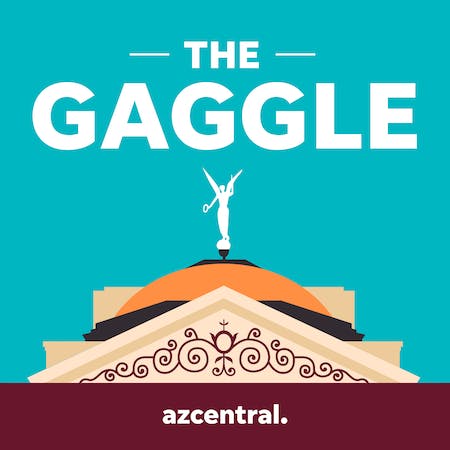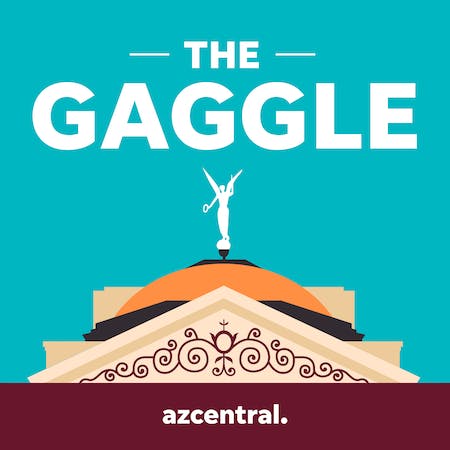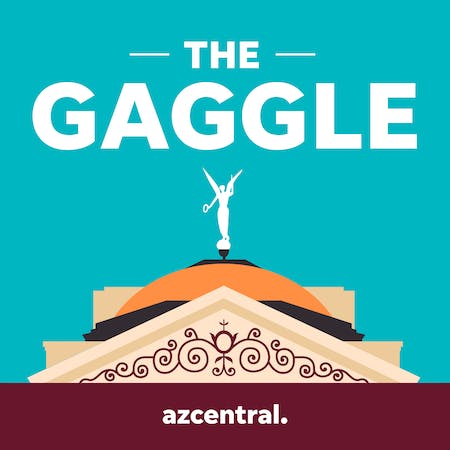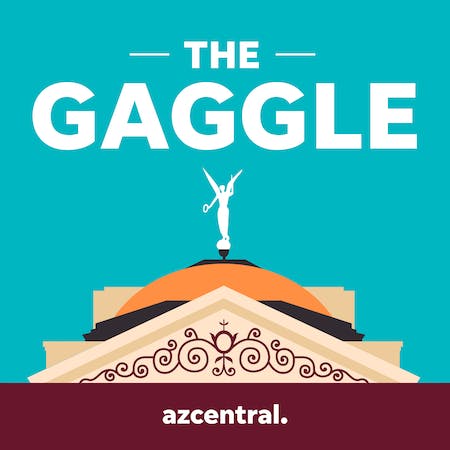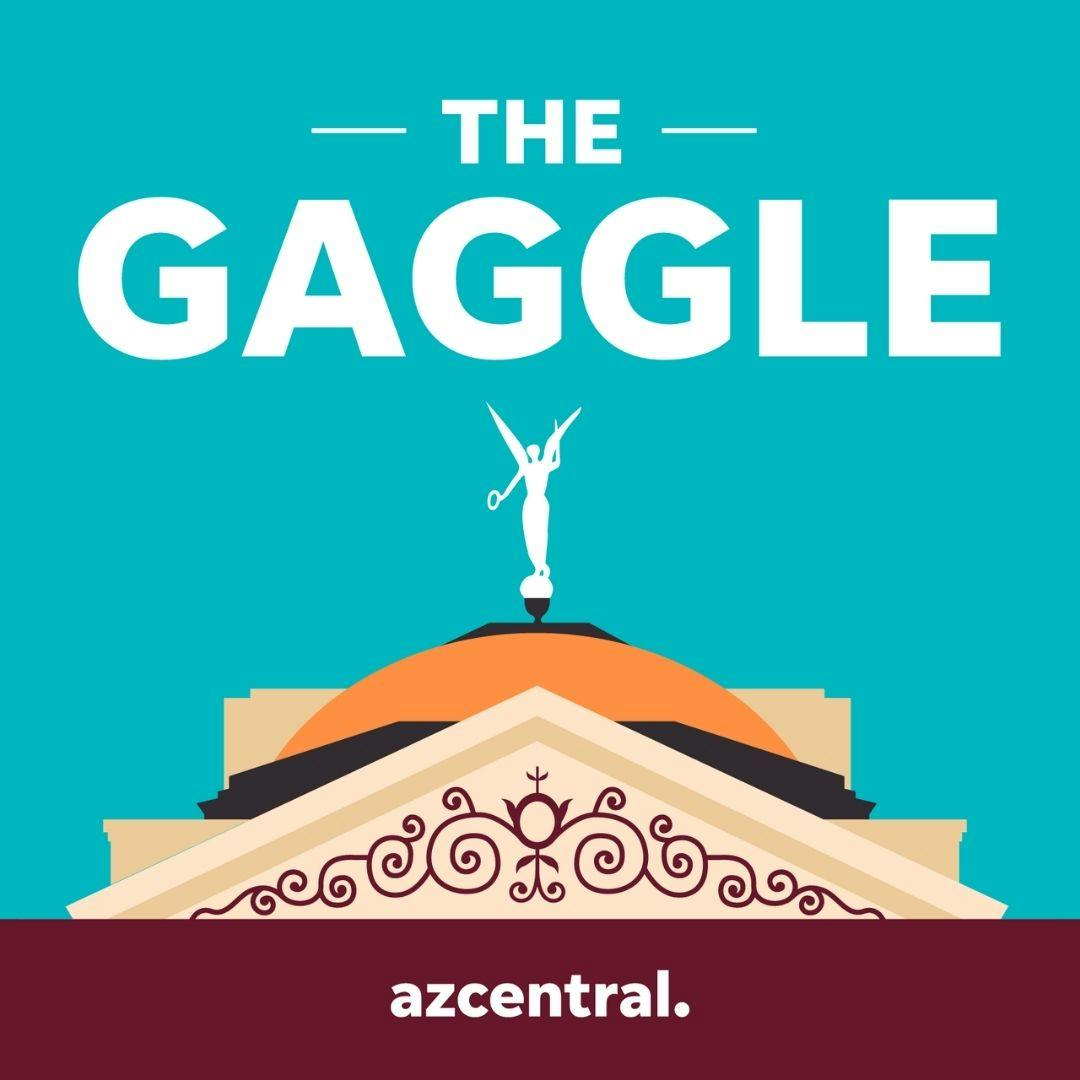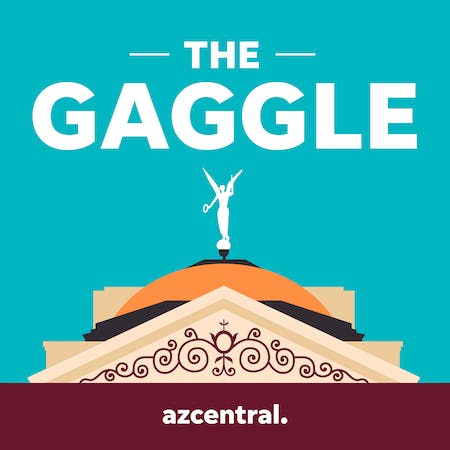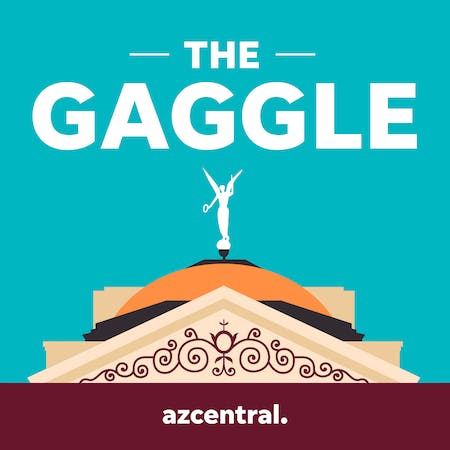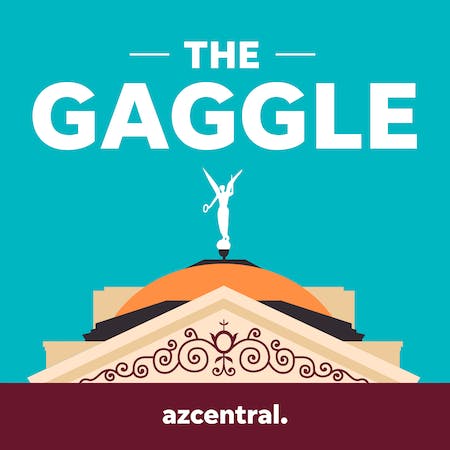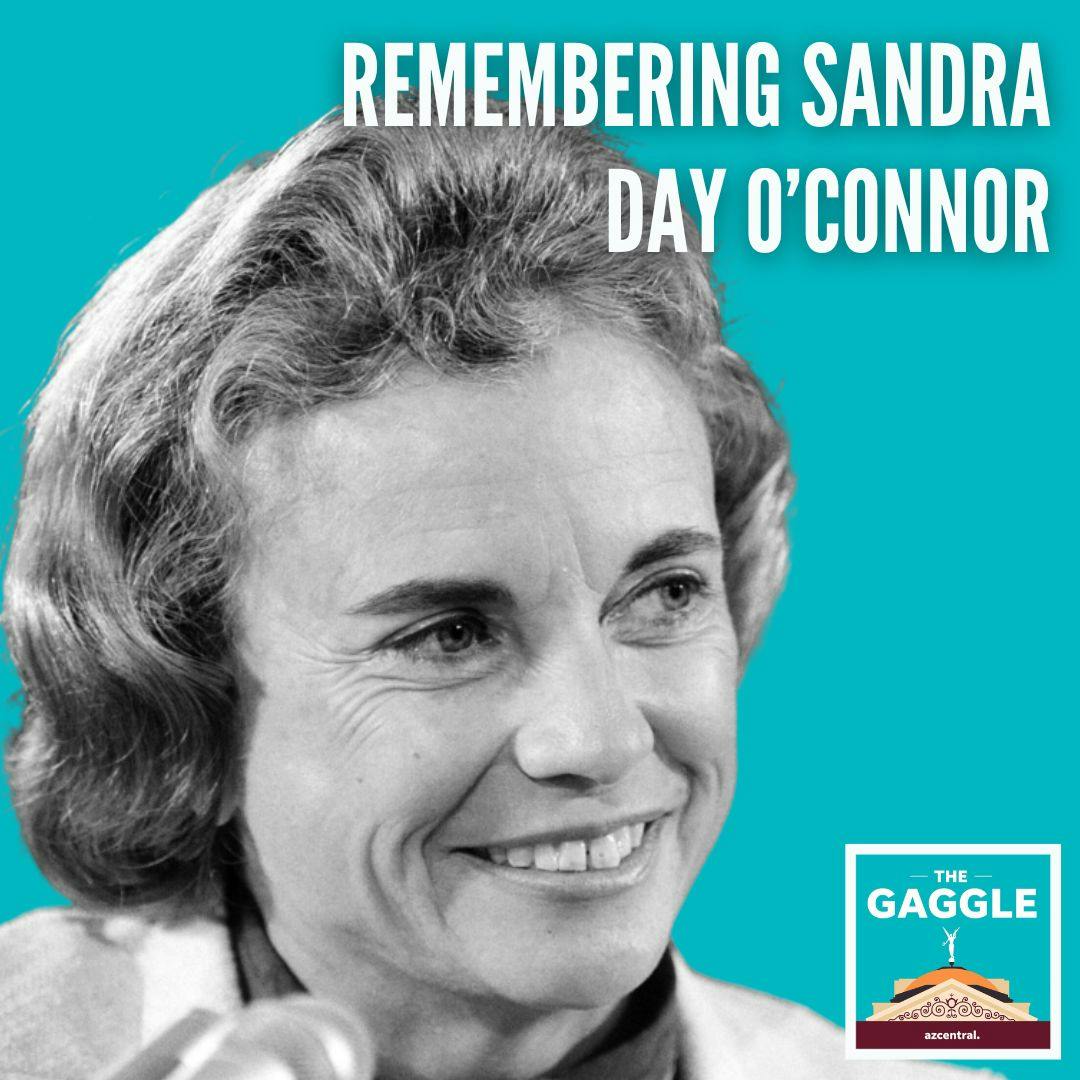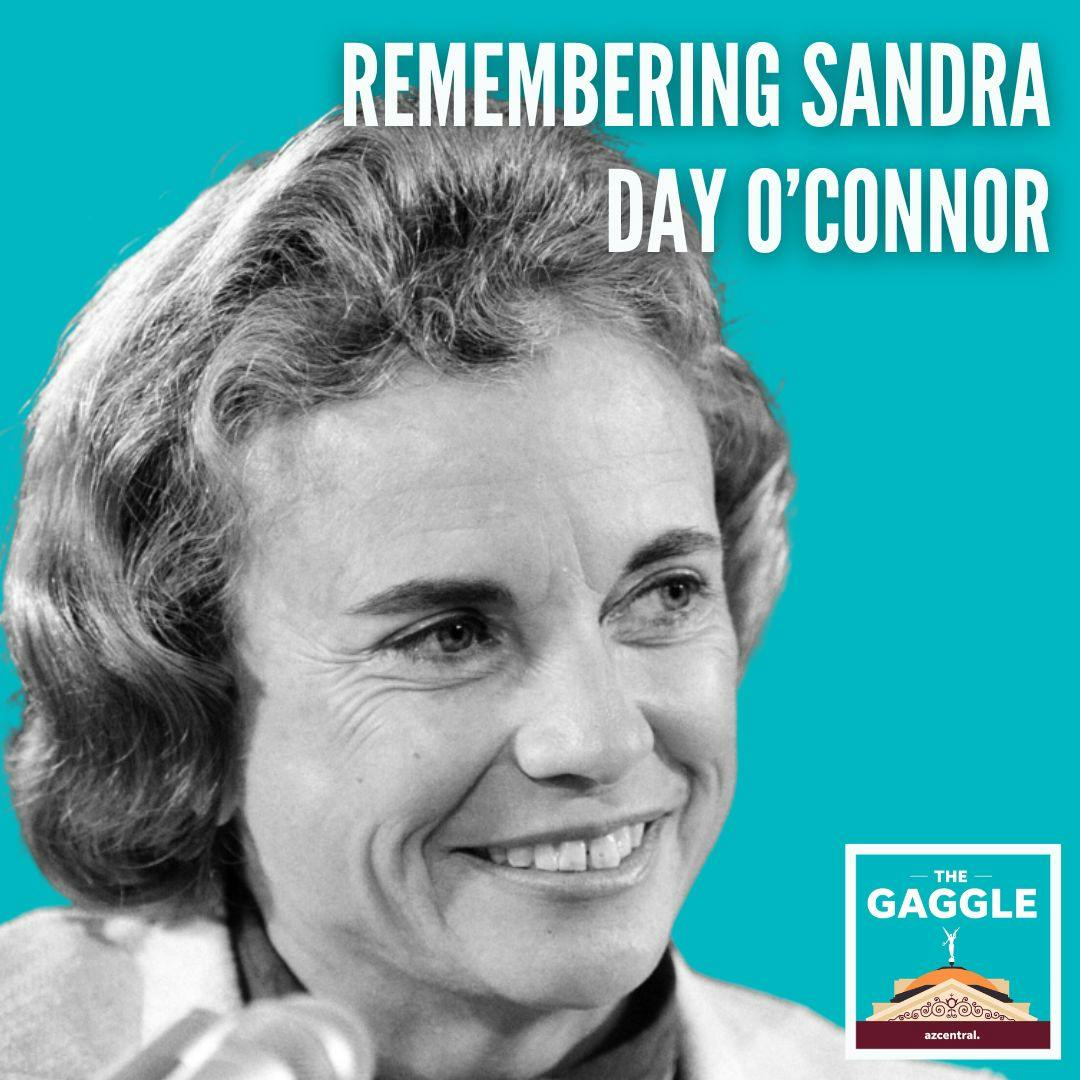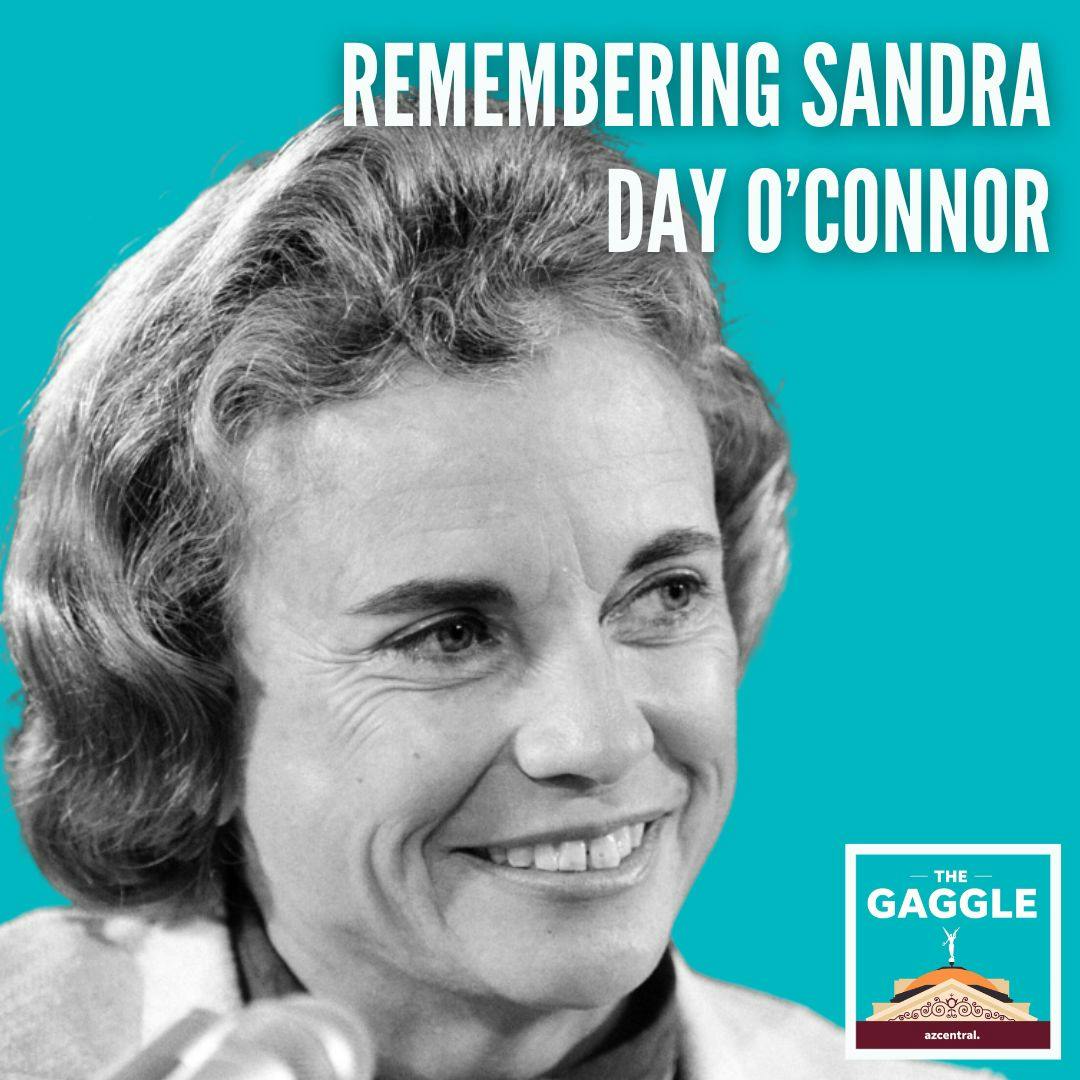Discover The Gaggle: An Arizona politics podcast
The Gaggle: An Arizona politics podcast

The Gaggle: An Arizona politics podcast
Author: The Arizona Republic and azcentral.com
Subscribed: 259Played: 11,097Subscribe
Share
© All rights reserved
Description
Helping you keep up with what matters in Arizona's political news. Each week we interview politicians, public figures or journalists to break down one local issue and how it affects your life in Arizona. Coming to you every Wednesday morning, The Gaggle is hosted by The Arizona Republic's national political reporter Ron Hansen and state politics reporter Mary Jo Pitzl. You can find them on social media at @ronaldjhansen and @maryjpitzl.
Producers of the show are Amanda Luberto and Kaely Monahan.
400 Episodes
Reverse
In her second year, Gov. Katie Hobbs has used her veto stamp much less than her first year.
By this time last year, the Democratic governor had denied a record-breaking 63 bills presented by the GOP-dominated Legislature. This year, Hobbs is at 42 vetoes.
Her second red stamp came across House Bill 2570, or the Arizona Starter Homes Act. Introduced by Rep. Leo Biasiucci, R-Lake Havasu City, it was intended to make homebuilding more efficient and thus more affordable.
But Hobbs said the bill couldn’t guarantee affordable home prices. She argued it went too far because it cut much of the local control cities have over development.
This week on The Gaggle, a politics podcast by The Arizona Republic and azcentral.com, host Mary Jo Pitzl is joined by housing expert Mark Stapp, the Fred E Taylor professor of real estate at the W.P. Carey School of Business at Arizona State University. He says the solution is more complicated than it seems.
Learn more about your ad choices. Visit megaphone.fm/adchoices
On Tuesday, April 9, the Arizona state Supreme Court ruled to uphold near total-ban on abortions dating back to 1864.
After the U.S. Supreme Court overturned Roe v. Wade in 2022, the exact parameters for Arizona went into question. Just months before, then-Governor Republican Doug Ducey signed a law that limited abortions to the first 15 weeks of pregnancy. In 1973, when Roe v. Wade went into effect nationally, Arizona had an abortion law dating back to its territorial days.
So the question became: which ruling would be the law of the land in Arizona? At the time, the state Court of Appeals overruled and instated the 15-week law. This week, the Arizona Supreme Court reversed this decision, allowing the 19th century law to take affect.
Today on The Gaggle, hosts Ron Hansen and Mary Jo Pitzl dissect Arizona's new, but ancient, abortion law and how it will impact the state politically and legally.
First, state politics reporter Stacey Barchenger joins the podcast to break down why the justices allowed at 160-year law to stand and who will benefit politically from the decision.
Later, University of Richmond law professor Carl Tobias joins The Gaggle to investigate the legal fallout from the court's decision.
Learn more about your ad choices. Visit megaphone.fm/adchoices
Imagine there is a ballot with several candidates seeking the same seat. And you like most of them. But you can only pick one because that’s what the rules require.
When that happens, the vote in a multi-candidate race is split – and the outcome often is the candidate you least like wins.
This is called vote splitting, a phenomenon that happens when a race attracts at least three candidates who have similar positions or maybe similar demographics. This makes it attractive for a contrasting candidate to benefit from the divided vote and prevail.
It’s happened time and again across the nation and here in Arizona.
Think Paul Gosar. He emerged from an eight-candidate field in 2010 to win the GOP primary in a heavily Republican district. It cemented his standing as an incumbent and he hasn’t lost since.
There’s a move afoot to stop vote splitting by introducing “approval voting,” a system where voters could vote for all of the candidates in a given race who appeal to them. And they could do that without ranking them. This is something the Center for Election Science, a national, nonpartisan nonprofit focused on voting reform, is pushing.
In this episode of The Gaggle, Mary Jo Pitzl examines the effect of vote-splitting, the potential issues it can cause, and some of the unintended consequences of the practice. You'll also hear about the related practice of ticket splitting, which factored prominently played a big role in the 2022 general election.
Joining Pitzl via Zoom are Nina Taylor, the organization’s CEO, and Chris Raleigh, director of advocacy and communication and a specialist in campaign management.
Learn more about your ad choices. Visit megaphone.fm/adchoices
Trust in the election system in Arizona is eroding. Some may even say it's broken all together. One side says the vulnerability of voting machines and delay in election results is what makes the system distrustful. This was most obvious during the Maricopa County recount of the 2020 ballots that lasted months.
The other side says it's the new found distrust in the system that makes it broken.
But either way a question remains among most American, and specifically Arizonan, voters: how can we make elections better?
This question fuels the work of David Becker. He is a co-founder of the Center for Election Innovation and Research and he believes that technology and reliance on data can help us toward improving elections. He also helped launch the Election Official Legal Defense Network, which connections election officials with free legal advice.
This week on Election Dissection, an elections series of The Gaggle podcast by The Arizona Republic and azcentral.com, hosts Mary Jo Pitzl and Sasha Hupka sit down with Becker to discuss why he's confident in the safety of our elections systems, how America ended up in this position and why he's keeping an eye on those who oppose Donald Trump come next January.
Learn more about your ad choices. Visit megaphone.fm/adchoices
Rents in Arizona have jumped significantly since the pandemic. In 2021, metro Phoenix made national headlines when rents skyrocketed by 30%. An investigation by the Arizona Attorney General's office reveals that a group of nine landlord companies have been using a software that allows them to see what other properties are charging and thereby "fix" their rental prices to match. Attorney General Kris Mayes is not having it and is seeking restitution for those affected. But that could take years. What about renters who need help now?
In this episode of The Gaggle, producer Amanda Luberto sits down with Stacey Barchenger, our state politics reporter, and Catherine Reagor who covers real estate issues. They hash out what could happen and what resources renters have access to right now.
Learn more about your ad choices. Visit megaphone.fm/adchoices
U.S. Rep. Debbie Lesko has had enough of Washington, D.C.
Lesko has represented the northwest Valley for six years after winning a special election to fill the spot for Trent Franks, who stepped down after allegations of sexual harassment involving his female staffers.
Lesko has been a strong supporter of former President Donald Trump, voting against his impeachment and voting in Congress to overturn the results of the 2020 presidential election.
But when former House Speaker Kevin McCarthy was being pushed out of office in a Republican-led coup, Lesko decided that she was done with Capitol Hill.
This week on The Gaggle, a politics podcast by the Arizona Republic and azcentral.com, host Ron Hansen is joined by Laura Gersony to dive into the crowded Congressional District 8 race to replace her. The Republic's two national politics reporters dissect the approach and positions of the candidates eyeing the open seat and discuss who has a chance of winning the primary in August.
Learn more about your ad choices. Visit megaphone.fm/adchoices
The battle over copper mining at Oak Flat, an area sacred to Native tribes, has been waged for two decades.
On March 1, the dispute marked a significant milestone: The 9th U.S. Circuit Court of Appeals narrowly rejected the argument from the grassroots group Apache Stronghold that mining activity would destroy First Amendment religious rites observed by Native tribes.
The court voted 6-5 to uphold a lower court’s denial of a preliminary injunction that sought to halt the transfer of federal land to Resolution Copper for the mining project.
The suit, Apache Stronghold v. United States, was filed in January 2021 in federal district court. After losing that ruling, the Native rights group took the case to the appeals court, where a three-judge panel rejected Apache Stronghold's assertion that the mine would pose a substantial burden to their First Amendment religious practice rights.
Oak Flat, located just shy of 70 miles east of Phoenix, is regarded as one of the most sacred sites to the Apache people. It has been at the center of debate on religious protections. Apache Stronghold, with the backing of the nation's largest religious freedom law firm, Becket Law, is resolute in its commitment to fight for the religious site's protection.
However, with this narrow ruling – a victory for Resolution Copper – the question now is: what’s next for the Apache people?
In this episode of The Gaggle, Mary Jo Pitzl and Kaely Monahan sit down with Indigenous Affairs Reporter, Debra Krol, to find out what's next for the sacred site.
Learn more about your ad choices. Visit megaphone.fm/adchoices
Suspicions about Arizona's voting returns have been growing for several years. It hit its peak in 2020, in the immediate aftermath of Joe Biden's narrow win over Donald Trump in this swing state.
In response, the Arizona state Senate launched what it called an audit of all Maricopa County ballots cast in November 2020. In reality, the organizer couldn't even vouch for the hand count of 1 million ballots.
This recount stirred not only conspiracy theories, but also worries from citizens that their ballots were not being counted. Attention switched to the early voting system, which allows people to vote by mail, in the 2022 election. Kari Lake, who lost the governor's race, contends that she did not win because of ballot tampering and is still arguing that point in court, even as she runs for U.S. Senate.
As Arizonans head into the newest presidential election, debate continues on the best way to vote: drop off boxes, vote centers, in-person or by mail. These options are the subject of legislation and litigation leading up to the big day in November.
This week on Election Dissection, an elections series of The Gaggle podcast by The Arizona Republic and azcentral.com, hosts Mary Jo Pitzl and Sasha Hupka examine different voting practices, their origins and their critiques.
County recorders for Maricopa and Yavapai, Stephen Richer and Michelle Burchill, discuss how they're keeping constituents reassured this election year. Rep. Rachel Jones, R-Tucson, explains why she’s sponsoring a ballot referral to end vote centers.
You'll also hear opinions on polling places from Rep. Jake Hoffman, R-Queen Creek, Sen. Bennett, R-Prescott, and Rep. Michael Carbone, R-Buckeye.
Learn more about your ad choices. Visit megaphone.fm/adchoices
Everyone knows 2024 is an election year but amid the chatter of who will be president of the United States is a wide selection of smaller, important local Arizona elections.
Residents in the small town of Litchfield Park will have the opportunity to cast their vote to be an official charter city. It's the first city in the Valley to do so in 40 years and will grant them independence from the state on things like when their elections are held and term limits on elected officials.
Tempe voters have the chance to elect who will sit on their city council. They will also vote on a proposition that will impact Tempe's ability to grow.
In this episode, producers Amanda Luberto and Kaely Monahan are joined by Republic reporters to discuss not only who is running and what is on the ballot, but why voters should turn out for these hyper-local elections.
We’ll also hear about one state senator who is trying to make changes to how cities can run their elections.
Learn more about your ad choices. Visit megaphone.fm/adchoices
The clock is ticking for Sen. Kyrsten Sinema to make a decision on running again for her seat.
The collapse of her bipartisan border security bill unceremoniously ended her hopes of adding a deal on perhaps the most difficult issue in congressional politics to her legislative scorecard.
Since quitting the Democratic Party in December 2022, Sinema’s fundraising has plummeted and she is about 20 percentage points behind her challengers in most of the polling on the race.
Democratic frontrunner, Ruben Gallego, and Republican front runner, Kari Lake, both have outraised Sinema, I-Ariz., of late. Sinema ended 2023 with her worst fundraising quarter in three years — and she spent more than she brought in.
All of which begs the question, does Sinema have a path to reelection, and what does that mean for the race if she’s stepping out of politics?
In this episode of The Gaggle, an Arizona politics podcast, hosts Ron Hansen and Mary Jo Pitzl are joined by Jessica Taylor of the Cook Political Report to look at how the Arizona senate race is stacking up and if there are any hints that Sinema might run for re-election.
Learn more about your ad choices. Visit megaphone.fm/adchoices
The U.S. has newly-released an $118 billion national security bill. It includes approximately $20 billion for border provisions, including $650 million for the border wall and funding for asylum judges, expanded detention capacity and other programs.
In a interview with CBS' Face the Nation, Arizona Sen. Kyrsten Sinema says that the deal will address a multitude of issues including the record surge of migrants.
But Republicans in both the Senate and the House are stirring against the proposal, with House Speaker Mike Johnson saying it's "dead on arrival."
In this episode of The Gaggle, hosts Ron Hansen and Mary Jo Pitzl sit down with The Republic's immigration and border reporter, Rafael Carranza to hash out what is in the bill and whether or not it's truly "dead on arrival."
Learn more about your ad choices. Visit megaphone.fm/adchoices
A busy election year is here. It starts with the March 19 presidential preference election, followed by the Aug. 6 primary, and then the Big One: the Nov. 7 presidential election.
On that day, voters all over the country will be ponying up to the polls to fill in the bubble of the candidates they want most. This year, the presidency is on the line.
But first comes the preference election. This election, also referred to as the primaries, isn't the same date in every state. Republican voters in New Hampshire and Iowa have already decided that former President Donald Trump is their pick to represent their party. Democrats in Iowa vote on March 5.
In Arizona, only Democrats and Republicans can vote on Tuesday, March 19 for which candidate they want to put forward into the big fight come November. Independent voters are out of luck for the preference election.
But how does all of this work? Who gets a say and why does it matter?
This week on The Gaggle, a politics podcast by The Arizona Republic and azcentral.com, hosts Mary Jo Pitzl and Sasha Hupka kick off a new series called Elections Dissection. Each month this year, they'll be breaking down a new elections process so you understand how voting in Arizona works.
In this episode, Mary Jo and Sasha talk with the man who brought preference elections to Arizona, a politician whose career was defined by a botched preference election, and an active county recorder who is working to avoid confusion at the polls.
Learn more about your ad choices. Visit megaphone.fm/adchoices
The "Gilbert Goons" have made headlines here in Arizona and nationwide. Young men from affluent families have been indiscriminately targeting others for violent beatings. One such attack ended in the death of 16-year-old Preston Lord.
Amid the many questions swirling around this case is one of particular relevance to you, our Gaggle listeners. What is the political fallout?
Producers Kaely Monahan and Amanda Luberto sat down with the team that broke the story: investigative reporter Robert Anglen and criminal justice reporter Elena Santa Cruz. Both are journalists in our newsroom.
Learn more about your ad choices. Visit megaphone.fm/adchoices
2024 is a pivotal year for Arizona. Not only is it a presidential election year, but the state is entering its second year with a divided government. Gov. Katie Hobbs has lined out her agenda for this year in her recent State of the State.
Speaker of the House, Ben Toma R-Glendale, has his own thoughts on how Arizona's 2024 should go. He currently presides over a narrowly divided chamber at the Phoenix capitol, and will help juggle the state's policy agenda.
The Republican from Glendale arrived at the Legislature in 2017 and is running for the West Valley congressional seat being vacated by Republican Debbie Lesko, who is retiring from
Learn more about your ad choices. Visit megaphone.fm/adchoices
Gov. Katie Hobbs officially started the new legislative session this week with her second State of the State address. She focused on areas where she's hopeful for bipartisanship: housing, the border and the state's water supply.
This year, Republican lawmakers mostly listened in silence. One senator, Anthony Kern, once again turned his back on Hobbs, literally, as he had in 2023.
Despite the turbulence and at a time when the state is facing a budget shortfall, this year’s speech had moments suggesting potential bipartisan cooperation. Kern’s protest was the only one of its kind this year, which was also an improvement over last year.
This week on The Gaggle, a politics podcast by the Arizona Republic and azcentral.com, hosts Ron Hansen and Mary Jo Pitzl are joined by Democratic political strategist Tony Cani and Kirk Adams, former chief of staff to previous Gov. Doug Ducey.
Together they break down Hobbs' Jan. 8 State of the State address to explore whether her strategic roadmap to bipartisanship is achievable and her goals for 2024.
Learn more about your ad choices. Visit megaphone.fm/adchoices
It's the beginning of a big year in Arizona politics.
Next week, Gov. Katie Hobbs will give her second "state of the state" address, reviewing her first year in office and her goals for the year ahead. This could set the tone for state politics in 2024.
Nationally, Arizona is expected to hold the political spotlight as one of a handful of swing states on the electoral map. President Joe Biden’s narrowest victory in 2020 came in Arizona. Democrats are looking to ride the blue wave and Republicans are looking to win back a state they had carried for years.
Arizona's U.S. Senate race could offer a rare three-way contest for the seat held by independent incumbent Kyrsten Sinema. That race already includes Democratic Rep. Ruben Gallego and Republican headliner Kari Lake. And the state could play a key role in the battle for control of the U.S. House of Representatives, with two seats currently held by the GOP on Democrats’ radar.
Both chambers in the state Legislature are narrowly divided, and Arizona voters likely will weigh a ballot measure to determine whether to enshrine abortion rights in the state’s constitution.
While you're writing down your New Year's resolutions, we're writing down a long to-do list. This week on The Gaggle, a politics podcast by The Arizona Republic and azcentral.com, hosts Ron Hansen and Mary Jo Pitzl are joined by other Republic reporters to give listeners a peek at our list.
You'll hear from state politics reporter Stacey Barchenger, investigative reporter Robert Anglen and Maricopa County reporter Sasha Hupka, among others. Together, they discuss what they're keeping an eye on for 2024.
Learn more about your ad choices. Visit megaphone.fm/adchoices
Another year in Arizona politics has come and nearly gone. What might be remarkable elsewhere is almost par for the course in the Grand Canyon State.
The year started with Arizona's first Democratic governor in more than a decade being sworn in on the ninth floor of the executive tower just before a legislative session with Republican majorities in both houses. Gov. Katie Hobbs went on to veto more bills than any other governor in state history.
Election denialism remained a theme. Kari Lake made statements and legal challenges over the year insisting the 2022 election for governor had been corrupted.
More than 1,400 text messages between Cyber Ninjas' CEO Doug Logan and others were revealed by Republic reporters using a simple software trick, uncovering more information about the "audit" of Maricopa County ballots in the 2020 presidential election.
Free speech battles raged on over college campuses, and a community near Scottsdale lost, then found, access to water.
This week on The Gaggle, a politics podcast by The Arizona Republic and azcentral.com, hosts Ron Hansen and Mary Jo Pitzl are joined by other Republic reporters, many of them Gaggle regulars, to break down the year 2023 in politics.
You'll hear from state politics reporter Stacey Barchenger, investigative reporter Robert Anglen, Maricopa County reporter Sasha Hupka and national politics reporter Ryan Randazzo.
Note: This episode was recorded before the death of former U.S. Supreme Court Justice Sandra Day O'Connor. While O'Connor is not discussed in this episode, The Gaggle has multiple exclusive interviews on her life. Listen wherever you get podcasts or by clicking here.
Learn more about your ad choices. Visit megaphone.fm/adchoices
The ranch girl from Duncan, Arizona who grew up to be the first woman to sit on the U.S. Supreme Court, passed away on December 1st, 2023. On December 18th, she entered the highest court in the land one last time. Thousands of Americans came to pay their respects.
Today we hear from her younger brother, Alan Day, about what it was like growing up with the ranch girl who would be come a Supreme Court justice.
National politics reporter and Gaggle host Ron Hansen connected with Alan Day remotely in the spring of 2022.
Learn more about your ad choices. Visit megaphone.fm/adchoices
Justice Sandra Day O’Connor, the first woman to sit on the U.S. Supreme Court was laid to rest this week. As the country said its final farewells to Arizona ranch girl, we here on The Gaggle have been honoring her life and legacy through a series of interviews with those who knew her.
Welcome to the third episode of The Gaggle’s mini series on Sandra Day O’Connor.
Thus far we have heard from O’Connor’s biographer and a historian. Today we turn to someone who was closer to the justice: Ruth McGregor.
A former chief justice Arizona Supreme Court, McGregor shared that she’s known Sandra Day O’Connor since the mid 1970s. First they worked solely as associates in the same field, but a friendship grew that lasted a life time.
McGregor sat down in the Gaggle studios in April 2022. Former Gaggle host, Yvonne Wingett Sanchez led the interview.
Learn more about your ad choices. Visit megaphone.fm/adchoices
This week, the country has said its final goodbyes to the first woman to ever sit on the U.S. Supreme Court.
To mark Sandra Day O'Connor's historical life, The Gaggle is sharing in-depth interviews with those that knew her. Yesterday we heard from her biographer, Evan Thomas. Today, we’ll hear from Linda Hirshman, a lawyer, cultural historian, and author of many books – including the 2016 “Sisters in Law: How Sandra Day O’Connor and Ruth Bader Ginsburg Went to the Supreme Court and Changed the World.”
Hirshman sat down in the Gaggle studios in spring 2022 with then Gaggle host Yvonne Wingett Sanchez.
For Hirshman, O’Connor is something of a complicated figure. In her words, O’Connor opened the door for extreme conservatism to enter the highest court in the land. At the same time, O’Connor was a defender of moderation, and believed strongly in nonpartisanship when it came to interpreting the law.
Learn more about your ad choices. Visit megaphone.fm/adchoices


